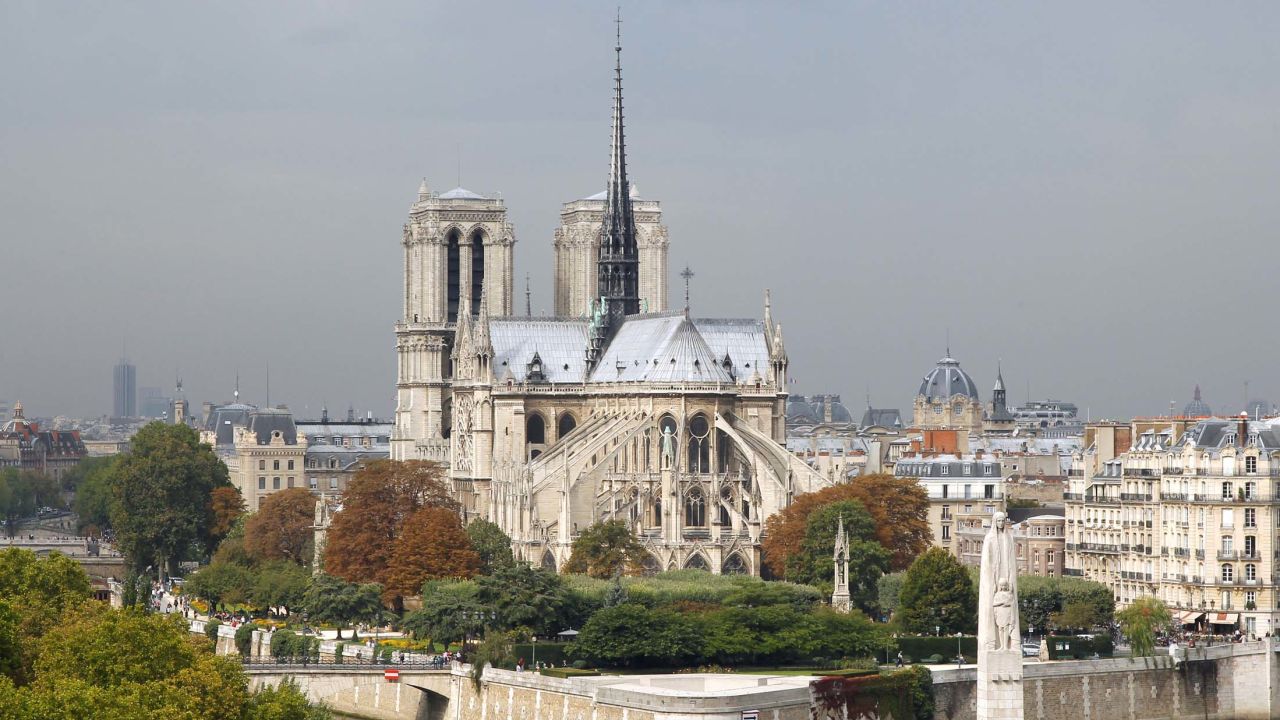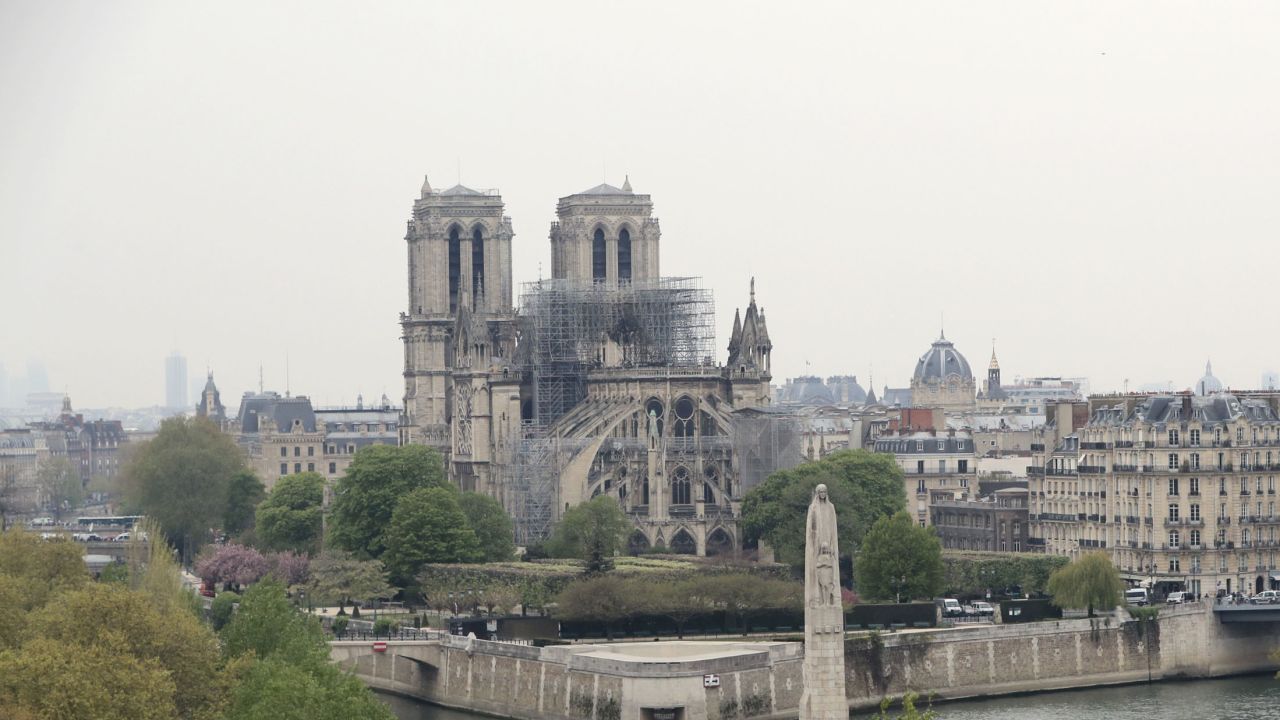At dawn on Tuesday, as the first blush of sunrise illuminated Notre-Dame de Paris, residents gathered on the left bank of the river Seine to see the damage wrought by a devastating fire that engulfed the historic cathedral overnight.
Sarah Virot crossed herself as she looked up at the 850-year-old Gothic masterpiece, whose name means Our Lady of Paris. The cathedral lost its iconic spire and much of its medieval latticework roof in the blaze.
“For me, it’s much more than stones, it’s a part of myself that is burning,” said Virot, 32, who works for a Christian association in the capital.
Nine years ago, she stood in the nave of Notre Dame, under its vast wooden rib-vaulted ceiling, known as “the forest,” for her confirmation in the Catholic Church. Seeing the cathedral now, its delicate limestone exterior marred with soot, she was at a loss for words.
In pictures: The fire that devastated Notre Dame Cathedral
The blaze was finally brought under control early on Tuesday morning after a heroic effort by 400 firefighters, who managed to save the cathedral’s iconic facade and twin towers, along with invaluable artifacts and works of art.
They had battled the fire for nine hours, pumping water from the nearby Seine onto the smoldering edifice as Parisians looked on in horror.
A Muslim man standing behind a police cordon chanted a song often heard at Paris Saint-Germain football matches. Runners on their morning jogs slowed, hopping from foot to foot as they assessed the damage. Tourists with suitcases in tow stood and stared. An elderly man with a cane walked down a cobblestone street to pay his respects.
“People are moved, whether they are Christians or not,” Virot said, adding that she was touched by the solidarity shown by Parisians and visitors alike, especially in the midst of the Holy Week.
The heart of Paris
Notre Dame sits at the French capital’s geographical and psychological heart, on a small island called the Île de la Cité, embraced on both sides by the Seine.
It’s not just the center of the city, but of the country; from it, all other distances to the capital are measured. And so, for Parisians, the cathedral is not just a religious structure, but a shared legacy.
Built in the 12th and 13th centuries, Notre Dame has survived rioting Huguenots, the French Revolution, two world wars, air pollution and acid rain.
It was the site of Napoleon Bonaparte’s coronation as emperor and the location for Victor Hugo’s famed novel “The Hunchback of Notre-Dame,” later enshrined in popular culture as a Disney fairytale.
“Notre Dame is our history, it’s our literature, it’s our imagery,” French President Emmanuel Macron said in a speech to the nation as the fire raged. “It’s the place where we live our greatest moments, from wars to pandemics to liberations. It’s an epicentre of our lives and the point where all distances start from.”
“It’s the cathedral of all French people, including those who never visited it,” Macron added. “This history is ours. And it burns. It burns and I know the sadness so many of our fellow French feel.”
Macron pledged to rebuild the cathedral, enlisting the nation’s master craftsmen and women; funding for the repairs has been swiftly secured from French billionaires.
Enduring symbol of France
The nation’s beleaguered president had been due to deliver a speech Monday night addressing the demands of the “Yellow Vest” movement, an uprising that began as a protest at rising fuel prices, but has grown into calls for a complete overhaul of France’s social safety net.
The months-long demonstrations have marred the capital’s famed boulevards, causing millions of dollars in damage and plunged the nation into a malaise.
But on Tuesday, the city came together to mourn an enduring symbol of France.
Notre Dame is not just a landmark that knits Parisians together, a shared cultural touchstone, but is admired the world over as a Gothic jewel.
Notre Dame cathedral, before the fire
The cathedral is visited by about 13 million people a year, drawn in equal measure by its religious significance, architectural mastery and rich history.
It has played host to royal weddings, coronations and the beatification of Joan of Arc. Notre Dame’s largest bell, known as Emmanuel, has tolled to mark global events including papal visits, the conclusion of World Wars and the September 11 attacks.
Sitting on a stone railing below one of the cathedral’s three enormous stained-glass rose windows, Sarah Parent du Châtelet was moved to tears at the prospect of its destruction.
“I came because I wanted to see something that was hard to imagine,” Parent du Châtelet, 33, told CNN. “I was born in Paris and I know this lady just like an immortal person. It’s impossible to imagine Paris without her.”
If the Eiffel Tower came to signify the city’s sparkling future, Notre Dame has, for generations, embodied its past. “She is the heart of Paris, eternal and spiritual,” Parent du Châtelet added.
Restoration project underway
The cathedral has been refurbished at several points over the last seven centuries, but had fallen into disrepair in recent years and was undergoing extensive renovations to safeguard the building – flying buttresses, decorative pinnacles, grimacing gargoyles and all – for the 21st century.
Just last week, 16 copper statues representing the twelve apostles and four evangelists were taken down from the cathedral so that refurbishments could be made to the spire. Other restorations were made in the cathedral’s attic, where the fire appears to have originated.
Its exterior was wrapped in scaffolding when the blaze took hold on Monday evening.
Paris prosecutor Rémy Heitz said specialists were beginning an investigation to ascertain what had caused the fire, but said there were no indications it had been started intentionally.
On Tuesday morning, four-year-old Martin, who attends a nearby pre-school, walked hand-in-hand with his mother, 37-year-old Alix De Castilla, among the crowds thronging the cathedral to check in on her.
De Castilla said she wanted to teach her son the importance of solidarity in a moment like this, the latest in a string of shocks to the capital, including floods when the Seine burst its banks last year and multiple terror attacks in 2015. She suspects this is a moment that will become important in his life as a Parisian.
As for Martin, after a long night of waiting and worrying about her fate he was relieved to see Notre Dame still standing. Pausing to smile up at Paris’ much-loved Lady, he breathed a sigh of relief: “It’s OK, she’s still there.”
Antoine Crouin contributed to this report from Paris.













































































